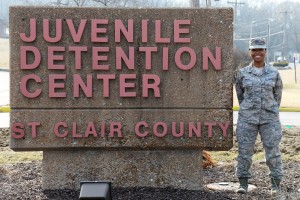Scott Airmen mentor youth at juvenile detention
Airman 1st Class Megan Friedl — March 28, 2015
Airman 1st Class Nijha Tasker, 437th Supply Chain Operations Squadron, is one of several military volunteers at the St. Clair Juvenile Detention Center. (U.S. Air Force photo by Airman 1st Class Megan Friedl)
SCOTT AIR FORCE BASE, Ill. — Airmen are encouraged to volunteer their time to make a difference in their community and the lives around them. That’s exactly what some Airmen from Scott Air Force Base are doing at the St. Clair and Madison County Juvenile Detention Centers.
About 50 Airmen from all different organizations at Scott work to mentor and influence juveniles to potentially change the path that they have gone down. The youth, who are 12 to 18 years old, are there for alleged crimes ranging from theft, battery, murder and rape.
“As a teenager there’s so many different directions you can go,” said Airman 1st Class Nijha Tasker, 437th Supply Chain Operations Squadron, a volunteer at the St. Clair County Juvenile Detention Center. “Knowing that I might be guiding someone to a brighter side than what they came from is the best part.”
The Airmen work with the youth at various stages of incarceration; from arrival, to processing through the court system and sentencing.
Tasker said she wants to meet them where they are and to help them see the positive side and what they can look forward to in life.
Master Sgt. Steven Patterson, Air Mobility Command, is the volunteer director of Madison County’s center, and said he likes to ask the youth questions such as, “Is this how you want to spend the rest of your life?”
Some of the volunteers who mentor frequently have also experienced similar situations and have grown up in gangs, but have turned their lives around. They say they are there to encourage the youth to not keep going down that path.
Tasker said, “I think that whenever you’re given the chance to pay it forward or give back you should take that opportunity because you never really know who you may affect.”
The volunteer program is not one-on-one, but rather in a group setting. This gives the Airmen the opportunity to share their experiences with all of the youth at once on how they’ve been able to overcome obstacles, how to set goals and how to become resilient.
By being positive, but also firm, these Airmen are influencing the youth to make changes to live a better, more productive life. The Airmen can see the changes they are making with the youth from the feedback and letters they receive from those they have helped along the way.



